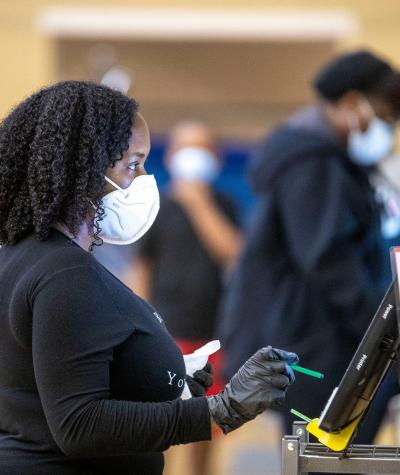The Georgia House of Representatives has hastily introduced an omnibus election bill that would make voting harder in a state that experienced record setting turnout in 2020. This partisan effort is part of a larger disturbing trend of restrictive voting bills that are gaining steam across the U.S. this year.
Jonathan Diaz, legal counsel for voting rights at Campaign Legal Center (CLC), named Georgia one of the three states to watch for new anti-voter laws this year, the others being Pennsylvania and Arizona.
Legislators were given limited time to read HB 531 before the hearing and the people of Georgia were blindsided by its release. CLC is a part of a coalition of voting rights organizations working to oppose this bill. If this omnibus bill is passed, it will be devastating for voting rights.
The omnibus bill would completely eliminate Sunday early voting, a move that blatantly targets a mobilization technique utilized by Black churches across the state of Georgia known as “Souls to the Polls”.
In addition, the bill would ban all out-of-precinct provisional ballots. Currently, a voter who shows up to the wrong precinct can fill out a provisional ballot and have their vote counted after their eligibility is confirmed. Under the omnibus bill, if a voter arrives at the wrong precinct and fills out a provisional ballot, their ballot will be rejected.
This ban would work in tandem with another section of the omnibus bill which requires precincts to be divided if they have over 2,000 voters and have voters who wait more than an hour in line to vote. The average voter wait time after 7 p.m. in Georgia is 51 minutes at polling places that are 90% or more nonwhite and just six minutes at polling places that are 90% white.
These two provisions would combine to cause the widespread relocation of precincts in urban areas inhabited predominantly by communities of color and the cancellation of the voters in those communities’ ballots.
That’s not all. The bill would also reduce voters’ use of drop boxes by limiting their locations and hours and shrink the windows for voters to request and receive mail-in ballots.
Georgia officials, including Republican Secretary of State Brad Raffensperger, have repeatedly debunked claims of systemic irregularities in the 2020 elections which are being used to justify this legislative agenda.
Election laws should be structured to increase voter participation, not erect deliberate barriers that silence voters. Democracy works best when all voices are heard.
